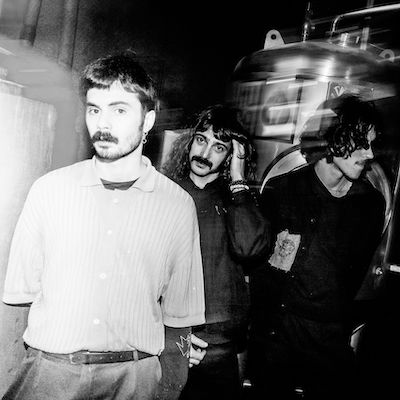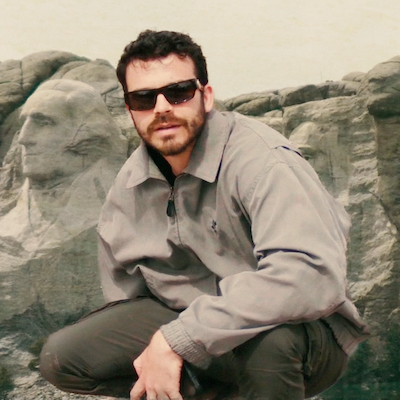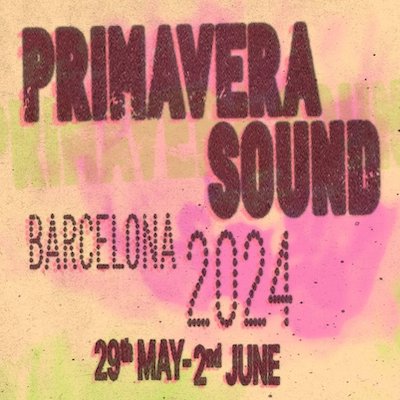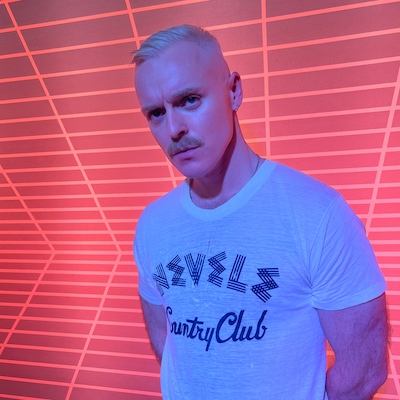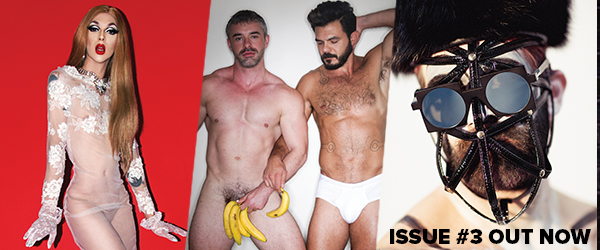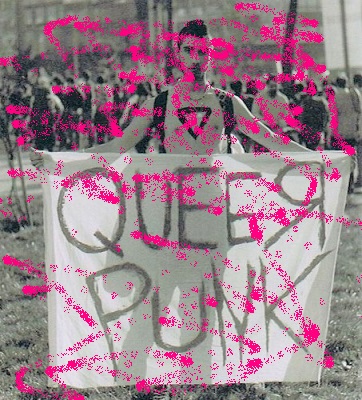
"Queer DIY is a model of getting stuff done. It’s not a stepping stone to ‘making it’"
London’s queercore scene is on fire right now and Loverboy’s Fallon Gold spoke to some of the multifarious lovelies involved to get the lowdown on the lofi world of pink punk.
Although the city has seen the decimation of its gay venues, along with Dalston’s prime punk music venue Power Lunches, the DIY ethic of queercore means that you can never thwart or silence these feisty, shouty music makers.
For the uninitiated, queercore (originally homocore) is an offshoot of punk and had an overlap with riot grrrl. It’s about being pissed off by the crap and marginalization we face as gay, bi, trans, pan – you know, all the queer food groups. There’s a lot of politics, a lot of screaming, a lot of fun in queercore. And DIY practice and aesthetic is right at its heart. Always wanted to pick up a guitar or bash some drums or make your lungs bleed by yelling into a cheap mic but thought you weren’t good enough? Queercore says, it doesn’t matter. There’s no such thing as ‘good enough’; everyone is enough. It’s the reverse of muso-snobbery. Come one, come all and have a go. As a result, some of the best gigs and EPs in recent times have come from LGBTIQA acts that are Doing It Themselves.
I spoke with Vanessa & Soph from Little Fists, Holly from The Potentials, Hannah from Gladiators Are You Ready (GAYR) and Bruce, Jose from GAYR and Kirsty from Actual Crimes, Suggested Friends and Cat Apostrophe about their experiences and thoughts on all things queercore.
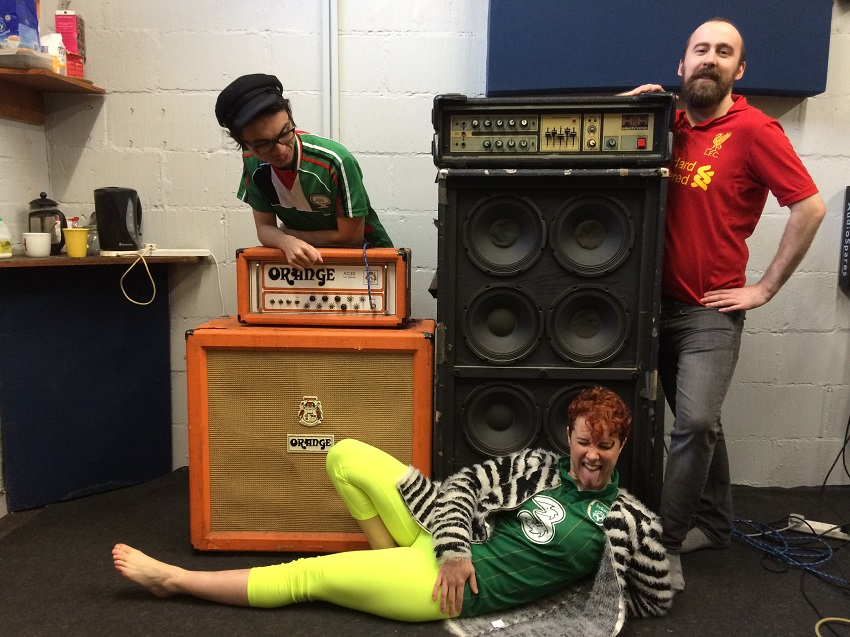
What is Queercore/DIY to you? And where does the music you make fit in with this?
Vanessa: the term Queercore will mean and hold different ideas and concepts depending on age and musical background. I grew up listening to a lot of punk hardcore and so the ‘core’ part to me still means hard and angry, and punk subculture. At present, it’s a scene that is accepting of the queer community whether you’re the artist/musician/band or the live-music-lover-goer. It’s also about providing a safe space for all. In my many years of playing live and attending gigs there are still issues involving sexism, racism, homophobia and transphobia.
The music business is changing because of how easily accessible it is to get hold of music and this includes new bands having a platform to put themselves out there. DIY culture has made it easy for new bands to get started, record material and play shows with others doing the same thing. It does not matter about musical ability and competence. It’s great to watch new bands grow and develop. You appreciate being thrifty with the small money we make from merchandise and gigs, and then putting that money back into the band to record for example.
Holly: When I was a teenager queercore was American bands like Team Dresch and Tribe 8 and fancying STS from The Haggard. It was something that absolutely changed my life and I wanted to be part of it but I didn’t know how. In my 20s it was UK bands like Valerie, and Lesbo Pig, and Jean Genet, Dragula, and Hummousexual and it was absolutely something for me to take part in and have a go. And now in my 30s it’s a bunch of UK DIY bands that are queer and play music and organise stuff in lots of ways and I’m still having a go and learning. Queer DIY is a model of getting stuff done, making things, putting on gigs, sharing resources. It’s not a stepping stone to ‘making it’.
Hannah: Fun, democratic, political, daft, noisy, emotional, enthusiastic amateurs, undiscovered talents, permission to have a go / make mistakes / learn, punk, accessible, shoestring budgets. I think the music of GAYR fits pretty much all of these in one way or another. I’m definitely the enthusiastic amateur of the group, mind. Jose and Ste are fucking amazing musicians and I feel incredibly lucky to be making stuff with them. I think that’s what I like most about this DIY thing – you realise that you don’t have to be in a special gang to have a go at music, or any arts, or performance. The bullshittery is stripped away and it’s just humans having a bash at stuff. And it’s having a great time playing and that’s fine and valuable and *schmaltz warning* kind of life-affirming. (God, sorry. Ugh)
Jose: I think queercore/DIY can be described as a group of people – queers and their allies/friends – coming together and creating a cultural, aesthetic, visual, and audio presentation of what it means and feels to be queer in one way or another. It’s something that is ongoing, open ended, and some type of collective mode of identifying with others like you and exploring that lived reality together through art.
It is something that remains tied to its history with bands like The Dicks, The Apostles, and zines like J.D.s; but it is also always being altered and transformed to the needs of its community.
Kirsty: I love DIY as an ethos because it does away with the good/bad binary in terms of creative practice (I really like thinking of myself as a shit punk) which is what always used to put me off making music previously. I’m queer and that definitely feeds into the lyrics I write and particularly any I write which touch on stuff about bodies, trauma and sex.
I see us as DIY cos when we started we were mainly just messing around on new instruments – I’d never played guitar or sung by myself in a band, I taught our last bass player how to play and our drummer had never played drums in a band before. Our songs are really short and simple and scrappy and our first tape was eight songs we recorded in one day, mistakes and all.
Actual Crimes split up in 2016 because two of us moved cities and it made sense to end it then. Now I play in Suggested Friends (mega queer sorta indie power pop) and Cat Apostrophe (sad lo-fi pop mainly about my feelings). Suggested Friends is based between London and Leeds and Cat Apostrophe are based in Leeds and Sheffield.
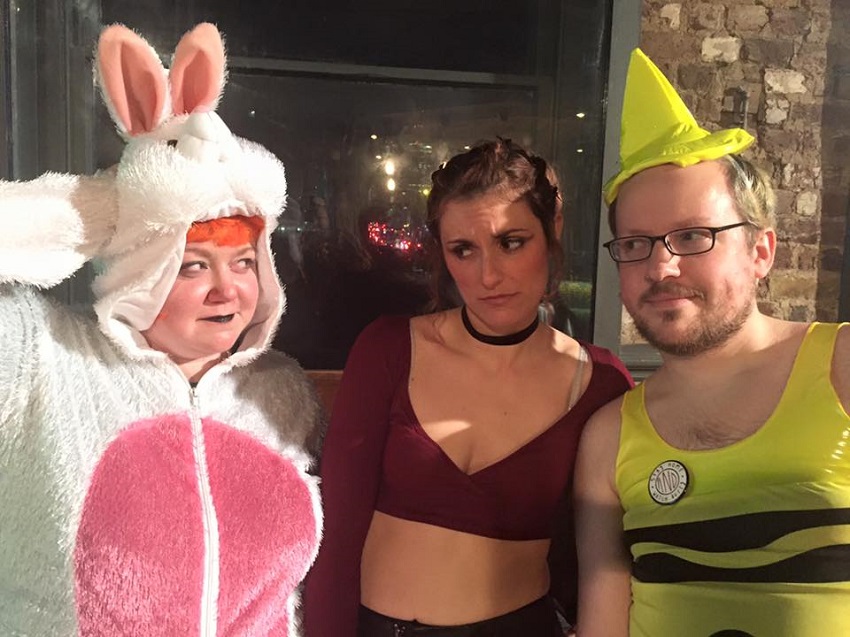
Yes! We should remember that queercore spans the whole of the UK. How much of the scene is about creating queer spaces?
Vanessa: Personally for me it’s about creating a safe space for all. I’ve played in a couple of venues where the promoters have always set out with the best intentions of creating a safe space but is hindered by cis het white men who happen to be local punters in the pub above. It makes for interesting conversation when you’re waiting to be served at the bar and you’re being told that ‘punk is punk’ and asked ‘why make it gay?’!
Kirsty: I think there’s some parts of DIY that are really explicit queer spaces (things like Bent Fest, [queer club night] Bloody Ice Cream when that went on) and then a lot of more general DIY shows which are very women/queer-centric, or which are queered up by visibility of rad queers. I’m trying to build femme punk community, because I’d like to see more queer spaces dominated by queer femmes (of all genders). In general, I find a lot of (not all of) DIY scenes have higher amounts of queer visibility than other music scenes I’ve been involved in over the years, which is GREAT.
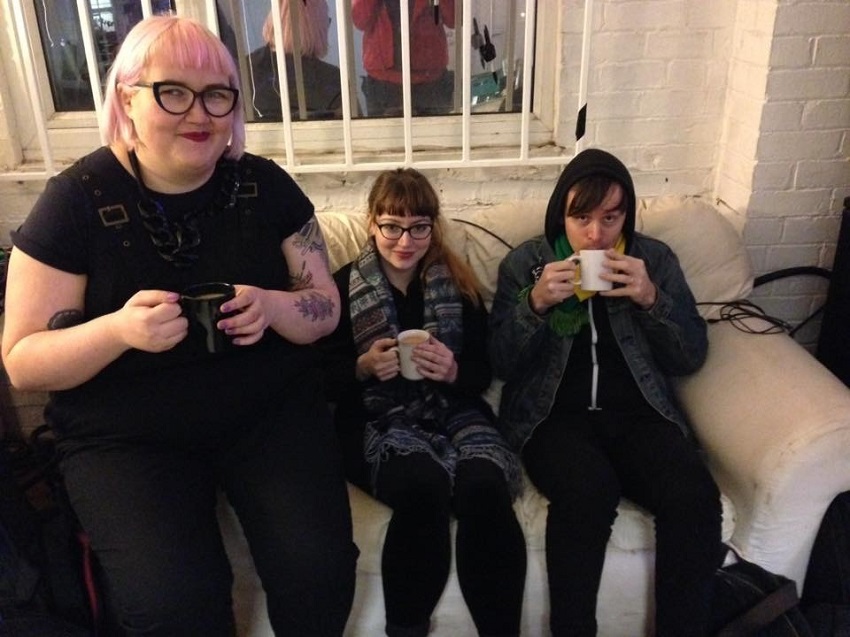
There’s always been problems with misogyny, backlash (especially against women being sexual/angry), sexual abuse, racism, class wars, homo, bi, transphobia and – that old chestnut of subcultural communities – the policing of just how part of that scene you ‘really’ are (are you cool enough, alternative enough, queer enough, angry enough? etc etc). Has queercore addressed any this do you think?
Vanessa: It’s addressed some of the issues but not all – eg. disability access information about a venue. There’s still a lot of educating and making people aware. One of my main gripes is tall people standing in front of me (I’m 5 ft 3’) when I’m watching a band. Short people to the front.
Hannah: The notion of a coherent community sort of amuses me. And sometimes makes me angry actually. There is a lot of mutual support between certain people and bands and club nights. If it is a community, it’s like any other: a collection of individuals who bump up against each other because of similar identities, interests, experiences, politics and plain old geography. And like all communities it has its strifes and beefs and bullies as much as its love, comradeship and support. There are divisions on the grounds there are in all communities – race, class, sexual identity, gender and age. Age is a really hidden one and the queer scene is often very young, demographic wise. It’s another element brought in from the wider world and one which heavily influences the voices that ring out most loudly and clearly. You’re always going to get cliques where you find humans. Tribes within tribes. Power struggles. There is a striving to find and create an alternative but nothing exists in a vacuum. We’re all affected by the world outiside this scene – the capitalist, corporate, neo-liberal, individualist world – and whether we like it or not, bring our share of shit and the need to prove ourselves and feel validated in from that experience. That’s grand if you accept that you do that, bring that shit, and that it’s yours. That you have a responsibility. It’s not all down to victimisation and an unjust world. There’s no getting away from the unjust world love, it’s all around you and always will be. If there’s one thing the human community everywhere needs to do, it is owning their own bullshit. I 100% include myself in that.
Jose: There is also the added element of polyamory/non-monogamy that exists in the queer scene. While being a benefit I’m sure there are times when people don’t necessarily want to be hanging around their primary partner’s metamor.
Kirsty: I think it would be way too utopian of me to suggest that the current DIY scene has solved all of those problems, and there is *no* denying that most gigs are still very white, middle class and sometimes also very straight male centric. I also think punk spaces can be very intimidating initially. I don’t book shows, but any time I’m involved in organising anything I try my best to avoid promoting the output of straight white cis middle class (etc etc) men, because I don’t tend to find it interesting in the first place, and I do find awesome rad queers doing stuff really exciting.
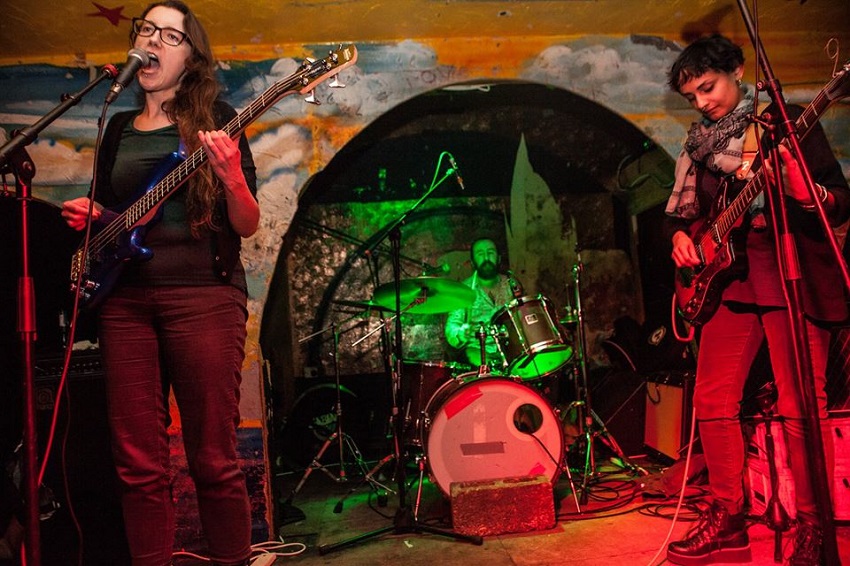
Tell us what you love!
Vanessa: Being in a band and playing with other bands; I’ve fallen for: Screaming Toenail, Teenage Caveman, Screen Wives, Joey Fourr… There’s so much more I can’t remember at the moment!
Hannah: So much stuff! But off the top of my head, today… Aside from all the lovely bands who play on this here music scene (obviously), at the minute I’m listening to a lot of Sleaford Mods, Peaches, Pulp, Grace Jones, Amanda Palmer, Nick Cave, Bruce Springsteen, M.I.A., Kate Bush, Death, Iggy Pop, Nina Hagen, bit of Britney!
Jose: Refused, At The Drive-In, Death From Above 1979, X-ray Spex, World Domination Enterprises, Le Tigre, Little Fists, Go Home.
Kirsty: Big Joanie, Fight Rosa Fight, Screaming Toenail, Efialtis, Woolf, The Potentials, Little Fists, Camp Shy, Sacred Paws, Shopping, Wolf Girl, Melge, Homosexual Death Drive, Suggested Friends, Trash Kit, ALL THE BANDS.
Soph: As ever, I have to sing the praises of The Ethical Debating Society – I’ve loved them for years, and they just get better & better. They manage to combine political & also hilarious lyrics with super catchy riot grrrl pop, and they’re also completely lovely people and super supportive of other bands.
Gladiators Are You Ready are my new favourite band – I might be a little biased because the members are my super rad bf Jose, Ste from Little Fists and my best friend Hannah, but THEY ARE SO GOOD! Filthy bass, relentless drums, ridiculous lyrics and Han has the most fantastic stage presence. LOVE.
I also love Des Ark, a band from North Carolina – the singer/guitarist Aimee says she writes ‘music for women and queers’ and she’s just badass, whether she’s singing something utterly heartbreaking or ragingly angry.
Finally: Placebo. Placebo are forever in my heart, even though their last few albums have been abysmal. I remember being so in love with Brian Molko that it made my heart hurt, and also realising that fancying such an androgynous/feminine man meant that it was only a small step to me being like DUH I like women too.
Hear/buy queercore by these wonders on their Bandcamps
Images, top to bottom: GAYR, The Potentials, Actual Crimes, Little Fists. Photo of Little Fists by Keira Cullinane.



